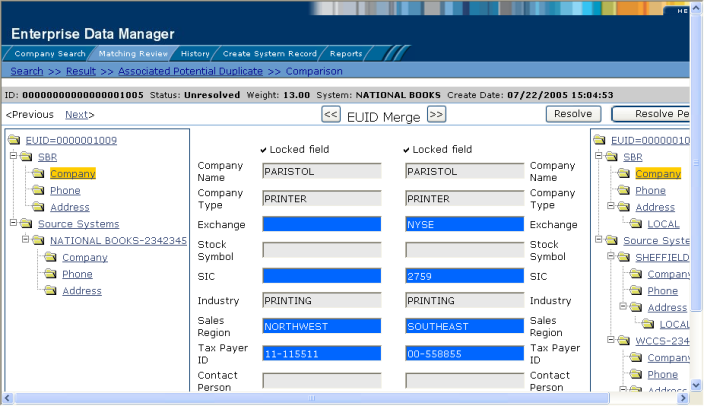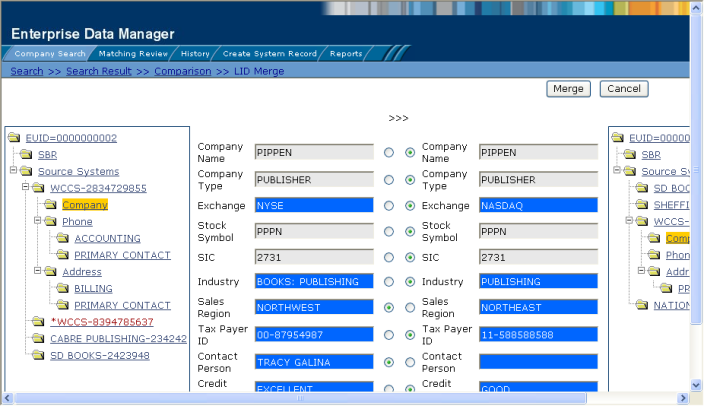| Skip Navigation Links | |
| Exit Print View | |

|
Working With the EDM for Oracle Java CAPS Master Index Java CAPS Documentation |
| Skip Navigation Links | |
| Exit Print View | |

|
Working With the EDM for Oracle Java CAPS Master Index Java CAPS Documentation |
Working With the EDM for Oracle Java CAPS Master Index
About the Enterprise Data Manager
About Oracle Java CAPS Master Index (Repository)
About Master Index Applications (Repository)
Features of Master Index Applications (Repository)
Functions of the Enterprise Data Manager
Learning about EDM Object Profiles
Object Profile Indicators on the EDM
System Record and SBR Components in a Master Index (Repository)
Identification Numbers for each Entity in the Master Index (Repository)
Working with the Enterprise Data Manager
Logging in to the Enterprise Data Manager
Enterprise Data Manager Security Permissions
Enterprise Data Manager Navigation Tips
Navigating the EDM Search Pages
Navigating the EDM Detail Pages
Learning About Object Queries on the EDM
Searching by Ranges on the EDM
Searching for Object Profiles on the EDM
Performing an EUID Lookup on the EDM
Performing a Local ID Lookup on the EDM
Performing an Alphanumeric Search on the EDM
To Perform an Alphanumeric Search
Performing a Phonetic Search on the EDM
Performing a Blocker Search on the EDM
Performing an EUID Comparison Lookup on the EDM
To Perform an EUID Comparison Lookup
Working with Search Results on the EDM
Viewing the Results of a Search
Sorting the Results of Your Search
Selecting a Profile from the Results List
Creating and Printing a Search Result Report
Learning About Object Profile Views on the EDM
Object Profile Details on the EDM
Object Profile Comparisons on the EDM
Object Profile Transaction Histories on the EDM
Object Profile Merge Histories on the EDM
Viewing Object Profile Information on the EDM
Viewing Object Profiles on the EDM
Comparing Object Information on the EDM
Comparing Records in one Object Profile
Viewing a Profile's Transaction History on the EDM
About Transaction History Search Fields on the EDM
About Transaction History Results Fields on the EDM
Transaction History Transaction Types on the EDM
Viewing a Profile's Merge History on the EDM
Viewing an Object Profile From a Merge History Tree
About Audit Log Search Fields on the EDM
About Audit Log Results Fields on the EDM
Audit Log Functions on the EDM
Adding an Object Profile on the EDM
Step 1: Obtain Information about the Object
Step 2: Specify a System and Local ID
To Specify a System and Local ID
Step 3: Specify Parent Object Information
To Specify Parent Object Information
Step 4: Specify Child Object Information
To Specify Child Object Information
Step 5: Save the Object Profile
Learning About EDM Maintenance Tasks
Surviving and Non-surviving Profiles
Handling Potential Duplicates on the EDM
Updating the SBR versus System Records
Modifying Profile Information on the EDM
Modifying Parent Object Information
To Modify Parent Object Information
Adding a Child Object on the EDM
Modifying a Child Object on the EDM
Deleting a Child Object on the EDM
Updating the Single Best Record Directly on the EDM
Adding a System Record to an Object Profile on the EDM
To Add a System Record to an Object Profile
Deactivating a Profile or System Record on the EDM
Deactivating an Object Profile
Reactivating a Profile or System Record on the EDM
Reactivating an Object Profile
Working with Potential Duplicate Profiles on the EDM
Finding Potential Duplicate Profiles on the EDM
About Matching Review Search Fields on the EDM
About Potential Duplicate Results Fields on the EDM
Merging Potential Duplicate Profiles on the EDM
Resolving Potential Duplicate Profiles on the EDM
To Resolve two Potential Duplicate Profiles
Working with Assumed Matches on the EDM
Finding Assumed Matches on the EDM
About Assumed Match Results Fields on the EDM
Reversing an Assumed Match on the EDM
Combining Object Information on the EDM
Merging Object Profiles on the EDM
Unmerging Object Information on the EDM
Unmerging Object Profiles on the EDM
To Unmerge two Merged Object Profiles
Unmerging System Records on the EDM
When you determine that two profiles represent the same object, you can merge the profiles to form one profile that contains the object’s most current information. You can also merge system records within one profile or from one profile to another. The resulting profile is called the Merge Result Record. The SBR for the surviving profile(s) is automatically recalculated based on the system records involved in the merge.
You can display the object profiles to merge using the Search function or the Matching Review function. This section describes how to merge records using the Search function. For information about merging records using the Matching Review function, see Merging Potential Duplicate Profiles on the EDM.
The following topics provide instructions for merging profiles or system records.
When you merge object profiles, all of the system records associated with the non-surviving object profile are transferred to the surviving object profile. The non-surviving profile is given a status of merged and is no longer active. The SBR of the surviving profile is recalculated based on the new system records that were added to the profile due to the merge. After merging two profiles, review the system records in the active profile to determine whether any of them should be deactivated.
Figure 49 Comparison Page - Merging Object Profiles

The Comparison page appears.
The merge result profile appears, allowing you to view the profile that will be saved after the merge.
You can merge a system record from one object profile into a system record from another object profile or you can merge two system records in one profile, as long as both system records originated from the same system. You can also specify which, if any, information to save from the non-surviving system record. When you merge system records, the non-surviving system record is transferred into the object profile of the surviving system record, and is given a status of merged. The SBR of the surviving profile is automatically recalculated.
Note - If you do not specify which child objects to retain during a system record merge, the master index application chooses for you; however, the EDM can be configured such that you must select which child objects to retain for certain object types (see your system administrator for more information about how your EDM is configured). If specifying child objects to retain is optional and you do not manually select the child objects, the default is to retain all child objects of a unique type from both system records. If there are any child objects of the same type, the default is to retain only the child object of the surviving system record. For example, if one system record has an office address and the other has a home address, both addresses are retained; but if both system records have a home address, the address of the surviving system record is retained.
Figure 50 Merging System Records

The Comparison page appears with the differences between the two records highlighted in blue.
Two LID Merge arrow buttons appear at the top of the page.
The merge result record appears, allowing you to view the information that will be saved in the SBR after the merge.
After you merge two system records, the surviving system record is updated, and the non-surviving system record is transferred to the “merge to” profile and is marked as merged. The SBRs for both object profiles involved in the merge are recalculated. If the “merge from” profile no longer has any system records, it is deactivated.